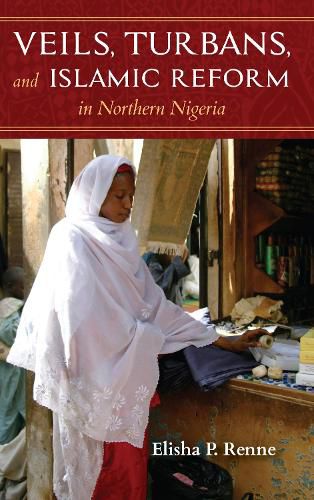Readings Newsletter
Become a Readings Member to make your shopping experience even easier.
Sign in or sign up for free!
You’re not far away from qualifying for FREE standard shipping within Australia
You’ve qualified for FREE standard shipping within Australia
The cart is loading…






Veils, Turbans, and Islamic Reform in Northern Nigeria tells the story of Islamic reform from the perspective of dress, textile production, trade, and pilgrimage over the past 200 years. As Islamic reformers have sought to address societal problems such as poverty, inequality, ignorance, unemployment, extravagance, and corruption, they have used textiles as a means to express their religious positions on these concerns. Home first to the early indigo trade and later to a thriving textile industry, northern Nigeria has been a center for Islamic practice as well as a place where everything from women’s hijabs to turbans, buttons, zippers, short pants, and military uniforms offers a statement on Islam. Elisha P. Renne argues that awareness of material distinctions, religious ideology, and the political and economic contexts from which successive Islamic reform groups have emerged is important for understanding how people in northern Nigeria continue to seek a proper Islamic way of being in the world and how they imagine their futures-spiritually, economically, politically, and environmentally.
$9.00 standard shipping within Australia
FREE standard shipping within Australia for orders over $100.00
Express & International shipping calculated at checkout
Veils, Turbans, and Islamic Reform in Northern Nigeria tells the story of Islamic reform from the perspective of dress, textile production, trade, and pilgrimage over the past 200 years. As Islamic reformers have sought to address societal problems such as poverty, inequality, ignorance, unemployment, extravagance, and corruption, they have used textiles as a means to express their religious positions on these concerns. Home first to the early indigo trade and later to a thriving textile industry, northern Nigeria has been a center for Islamic practice as well as a place where everything from women’s hijabs to turbans, buttons, zippers, short pants, and military uniforms offers a statement on Islam. Elisha P. Renne argues that awareness of material distinctions, religious ideology, and the political and economic contexts from which successive Islamic reform groups have emerged is important for understanding how people in northern Nigeria continue to seek a proper Islamic way of being in the world and how they imagine their futures-spiritually, economically, politically, and environmentally.